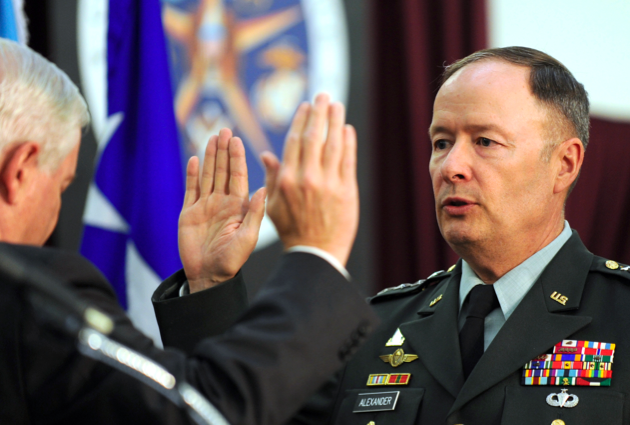
<a href="http://www.defense.gov/dodcmsshare/photoessay/2010-05/hires_100521-D-7203C-013a.jpg">Department of Defense
In the wake of Edward Snowden’s leaks, National Security Agency and Justice Department officials testified today before the House intelligence committee about the government’s controversial surveillance programs. Here are the five most interesting revelations to emerge from the hearing:
1. Surveillance has contributed to thwarting more than 50 terror plots since 9/11, according to the NSA.
NSA Director Keith Alexander testified that NSA surveillance has played a role in preventing more than 50 terrorist attacks since September 11, 2001. FBI deputy director Sean Joyce provided an outline of four of those cases:
- The 2009 arrest of Najibullah Zazi for plotting to bomb the New York City subway system came after the NSA intercepted an email in which he discussed perfecting a bomb recipe. The agency executed search warrants with New York Police Department and found bomb-making components. (Serious questions have been raised about whether the FBI actually needed NSA surveillance in order to obtain this information, since the FBI wouldn’t have had trouble getting a warrant to monitor the email account of a terrorist suspect.)
- Using its authority under the Foreign Intelligence Surveillance Act (FISA), the NSA discovered Khalid Ouzzani’s nascent plans to bomb the New York Stock Exchange. Ouzzani pleaded guilty in 2010 to providing support to Al Qaeda.
- NSA surveillance derailed David Headley’s 2009 plan to bomb the offices of a Danish newspaper. At the time, he was considered a suspect in the 2008 terrorist attacks in Mumbai. He later confessed to conducting surveillance for the Mumbai attacks.
- Joyce only provided vague details about a fourth plot: After 9/11, the NSA monitored an individual who had indirect contact with a known foreign terrorist organization overseas. Doing so, he said, allowed the FBI to reopen an investigation and disrupt terrorist activity.
2. The NSA doesn’t need court approval each time it searches Americans’ phone records.
NSA Deputy Director John Inglis said that 22 NSA officials are authorized to approve requests to query an agency database that contains the cellphone metadata of American citizens. (Metadata includes the numbers of incoming and outgoing calls, the date and time the calls took place, and their duration.) Deputy AG Cole also said that all queries of this database must be documented and can be subject to audits. Cole also said that the the NSA does not have to get separate Foreign Intelligence Surveillance Court (FISC) approval for each query; instead, the agency merely has to file a monthly report with the court on how many times the database was queried, and how many of those searches targeted the phone records of Americans.
3. 10 NSA officials have permission to give information about US citizens to the FBI
There are 10 NSA officials—including Inglis and Alexander—involved in determining whether information collected about US citizens can be provided to the FBI. It can only be shared if there’s independent evidence that the target has connections to a terrorist organization. Inglis said that if the information is found to be irrelevant, it must be destroyed. If the NSA mistakenly targets an American citizen, it must report this to the Foreign Intelligence Surveillance Court.
4. Other countries are less transparent than the US, officials say.
Cole said that the FISA Amendments Act provides more due process than is afforded to citizens of European countries, including Germany, the United Kingdom, and France. Alexander added that “virtually all” countries have laws that compel telecommunications firms to turn over information on suspects.
5) Fewer than 300 phone numbers were targeted in 2012.
NSA officials say that even though the agency has access to Americans’ phone records, it investigated fewer than 300 phone numbers connected to US citizens in 2012. The officials did not provide any detail on the number of email addresses targeted.















